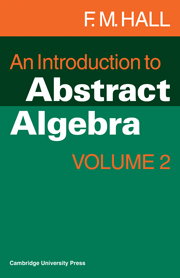8 - EXTENSIONS OF STRUCTURES
Published online by Cambridge University Press: 12 October 2009
Summary
Introduction and examples
A very common procedure in abstract algebra is that of obtaining new structures from ones which are already known. We have used this idea many times in the previous chapters and in volume 1—see the examples below.
There are two main purposes in investigating such extensions. The first is so that we can study a structure in terms of its components, which are usually simpler. Thus we are interested in the substructures of a given group, ring or field and in the relationship that the whole structure bears to them. We have used this idea in expressing sets as the direct products of two or more of their subsets.
The second purpose is to obtain new structures, by applying certain more or less standard methods to sets that we already know. We may thus obtain structures that possess some required additional property: for example the integers do not admit of division and we extend these to the field of rationals so as to obtain a set that does so, while still containing a subset isomorphic to the integers. In many cases we use the extension methods in order to obtain rigorously definitions of sets that we already know about intuitively: the complex numbers give a good example, where the rigorous development by number pairs is somewhat tedious but gives us a secure foundation for working with complex numbers, defining them in terms of real numbers, which are already known.
Information
- Type
- Chapter
- Information
- An Introduction to Abstract Algebra , pp. 207 - 224Publisher: Cambridge University PressPrint publication year: 1969
